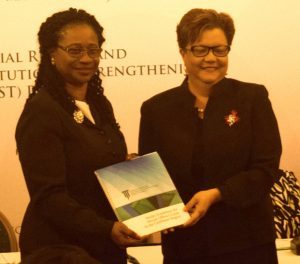 Sexual offences cases will now receive the special attention needed via the Courts with
Sexual offences cases will now receive the special attention needed via the Courts with
the commissioning of a new courtroom and the launch guidelines to deal with such matters. The sexual offences court was commissioned at the Georgetown High Court yesterday, hours before the guidelines were officially launched at the Pegasus Hotel. Court Six of the Georgetown Supreme Court has designated to deal with the sexual offences matters. Speaking at the launch of the model guidelines for Sexual Offence cases, Chancellor of the Judiciary, Yonette Cummings-Edwards, noted that the initiative is part of the Judicial Reform and Institutional Strengthening (JURIST) Project.
The guidelines are intended to provide internationally accepted best practices for the management of sexual offence cases, and offer a rights-based approach to the treatment of complainants and vulnerable witnesses, including children, involved in sexual assault cases.
Justice Cummings-Edwards expressed hope that the initiative will help to change the way the judiciary deals with sexual offences cases. She noted that because of the guidelines, many more persons will come forward. “Not only will they want to come forward, but they will be treated in a way that will respect their dignity and their privacy,” she stated adding that no longer will victims be “retraumatised” by giving their evidence in court.
The Chancellor Minister of Social Protection, Amna Ally, noted that Guyana is in the process of conducting a comprehensive review of our national plan of action for the implementation of the sexual offences.
The Minister explained that interagency task force will have specific responsibilities for the development and implementation of a national plan of action for the prevention of sexual violence. Social activist and Director of Red Thread, Karen De Souza, was also among those to address the gathering the launch yesterday. DeSouza stressed the importance of having a multi-stakeholder approach to sexual offences.
The social activist noted that the judicial arm alone that needs to play a part in addressing cases of sexual abuse. She expressed hope that the new guidelines will aid in expediting the legal process for such cases. Meanwhile Justice at the Caribbean Court of Justice (CCJ), Maureen Rajnauth-Lee, explained that even though the CARICOM region has made progress in promoting gender equality, sexual violence perpetrated against women, girls and boys remains a significant problem. The region, she said, experiences high levels of sexual violence – the majority of which is under-reported and ineffectively dealt with by the justice system. She noted there have been improvements in the justice system’s response to sexual assaults and the survivors of sexual violence who seek redress from the courts.
Justice Rajnauth-Lee stated that the Guidelines will provide guidance to justice sector stakeholders involved in the reporting, investigation, prosecution and adjudication of sexual offences. Project Director, Dr. Penny Reedie, hailed the development of the guidelines as a major milestone in the life of the Project.
“The guidelines are the result of hard work, dedication, and commitment to improve the management of sexual offences cases throughout the region and the treatment of survivors of sexual offences,” she noted. The JURIST Project is a five-year regional Caribbean judicial reform initiative funded under a CAN$19 million arrangement with Global Affairs Canada.
The Project is being executed by the Caribbean Court of Justice (CCJ) on behalf of the Conference of Heads of Judiciary of CARICOM. The CCJ and other regional partners are also contributing approximately CANADIAN $4 million to the Project.
The JURIST Project has been working with judiciaries in the Caribbean to support their own efforts to improve court administration and strengthen the ability of the courts and the judiciary to resolve cases efficiently and fairly.
Its aim is to modernise and strengthen court systems, processes and services; and to equip judicial officers and court staff with the skills and competencies necessary to deliver justice in a fair, predictable, efficient and timely manner.
The ultimate goal of the JURIST Project is to develop a regional judicial system that is more responsive to the needs of women, men, youth and the poor.
Courtesy: www.kaieteurnewsonline.com






